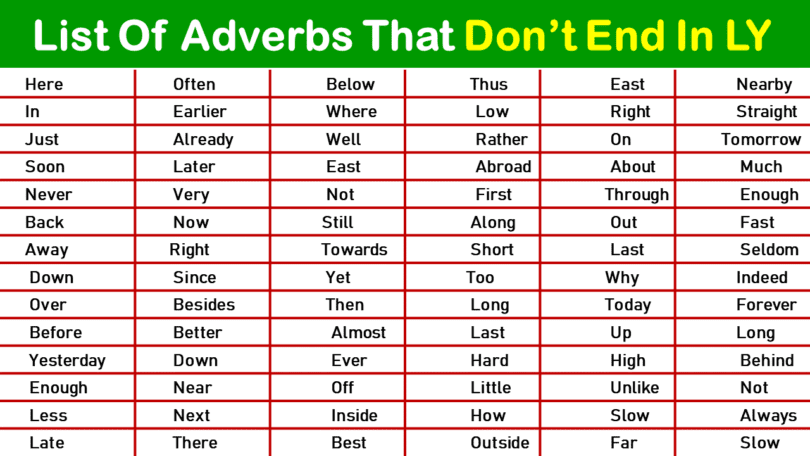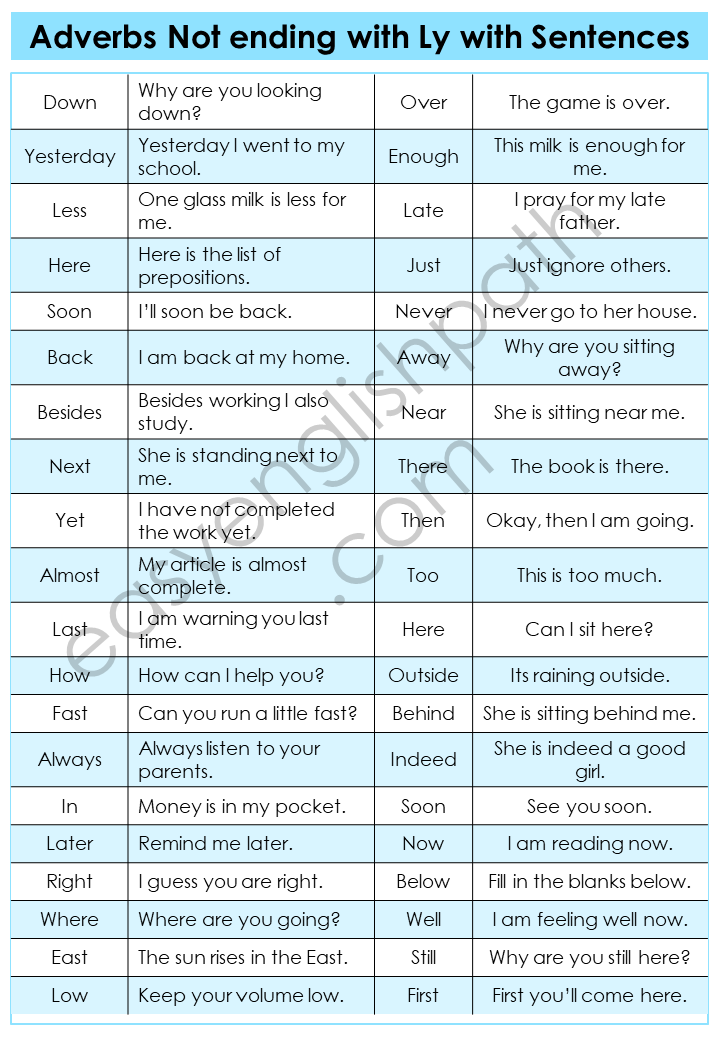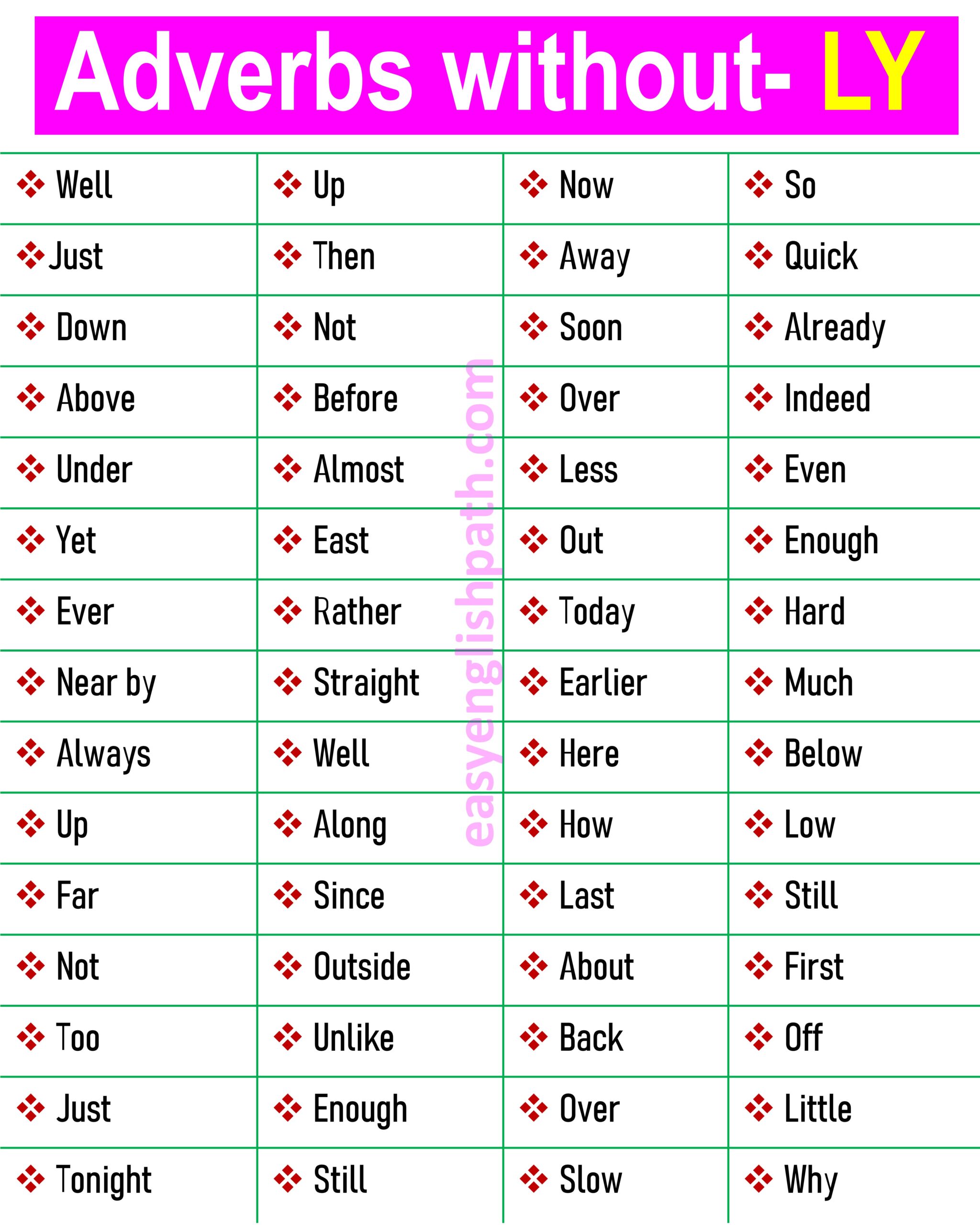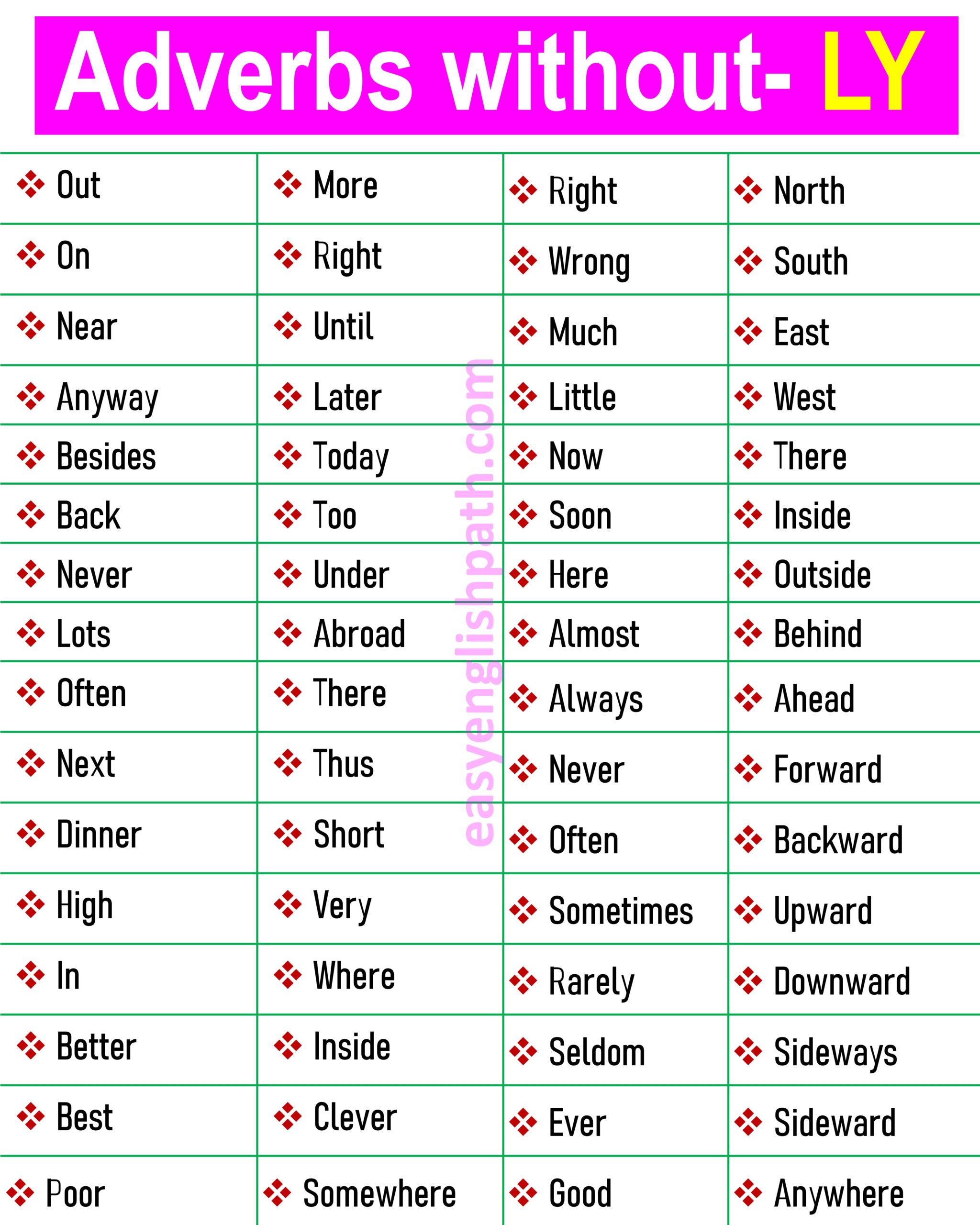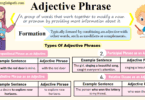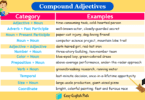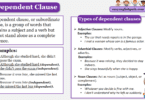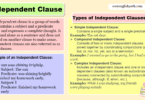Adverbs are essential for adding detail and depth to writing, but not all end in -ly. Understanding adverbs without -ly can enhance your writing skills and make your language more diverse and expressive. Examples like fast, hard, and late show how these words function effectively. This guide will discuss various adverbs without -ly, providing clear examples to help you use them correctly and improve your writing proficiency.
Adverbs Ending in ‘LY’ with Example
- Well:
She performed exceptionally well on the test. - Fast:
He runs fast in the morning. - Hard:
He worked hard to complete the project. - Late:
We arrived late to the party. - Early:
She woke up early to catch the sunrise. - High:
The plane flew high in the sky. - Low:
The water level in the lake is low. - Far:
The grocery store is not too far from here. - Near:
The park is near our house. - Deep:
The ocean is deep and mysterious. - Straight:
The road stretches straight ahead. - Bright:
The sun shines brightly on a clear day. - Loud:
The music was too loud at the concert. - Quiet:
It’s nice and quiet in the library. - Quick:
He made a quick decision. - Slow:
The traffic moved slowly during rush hour. - Daily:
I read the newspaper daily. - Weekly:
They meet for a book club weekly. - Monthly:
We pay the rent monthly. - Yearly:
They go on a vacation yearly. - Tight:
The lid on the jar was too tight. - Loose:
Her dress felt loose after she lost weight. - Right:
Turn right at the next intersection. - Wrong:
His answer was completely wrong. - Much:
There is much work to be done. - Little:
She ate a little of the cake. - Now:
I need your help now. - Soon:
The bus will arrive soon. - Here:
I’m here to pick up the package. - There:
The keys are over there on the table. - Almost:
She almost missed her flight. - Always:
He always arrives on time. - Never:
I never eat spicy food. - Often:
They often go hiking on weekends. - Sometimes:
Sometimes, life can be unpredictable. - Rarely:
He rarely watches television. - Seldom:
Seldom do we see such a beautiful sunset. - Ever:
Have you ever been to Paris? - Poor:
The beggar looked poor and hungry. - Good:
She did a good job on her project. - Great:
That was a great performance on stage last night. - Bad:
The weather turned bad suddenly. - Right:
You are absolutely right about the situation. - North:
They traveled north to escape the heat. - South:
The birds migrate south for the winter. - East:
The sun rises in the east every morning. - West:
We watched the sun set in the west. - Quick:
She made a quick decision to accept the job offer. - Slow:
The tortoise moved slowly but steadily in the race. - Daily:
She takes a daily walk in the park for exercise. - Weekly:
We have our team meetings weekly. - Monthly:
The magazine is published monthly. - Yearly: We celebrate our anniversary yearly.
- Hardly:
He hardly ever eats junk food. - Nowhere:
There was nowhere to hide from the rain. - Always:
She is always ready to help others. - Often:
They often visit their grandparents. - Usually:
I usually have cereal for breakfast. - Rarely:
I rarely get sick. - Early:
He gets up early to catch the sunrise. - Late:
I stayed up late to finish my work. - Much:
There is much to be done before the deadline. - Little:
He had little patience for waiting. - Inside:
The cat is hiding inside the box. - Outside:
The kids are playing outside in the yard. - Quickly:
She completed the puzzle quickly. - Slowly:
He walked slowly in the rain. - Tight:
The lid was on tight, and I couldn’t open it. - Loose:
His shoelaces were loose, and he tripped. - Straight:
The road ahead stretches straight for miles. - Bright:
The stars shone bright in the night sky. - Loud:
The thunder was loud during the storm. - Quiet:
The library is a quiet place to study. - High:
The plane flew high above the clouds. - Low:
The price of the item was low. - Daily:
He practices the piano daily to improve his skills. - Weekly:
We have a family meeting weekly to discuss our plans. - Monthly:
She sets aside a portion of her salary monthly for savings. - Yearly:
They go on a yearly vacation to relax and unwind. - Almost:
She almost missed her flight due to traffic. - Always:
He always arrives early to avoid being late. - Never:
I never eat spicy food because I can’t handle it. - Often:
They often visit their grandparents on weekends. - Sometimes:
Sometimes, you just need to take a break and relax. - Rarely:
I rarely go out to eat; I prefer cooking at home. - Seldom:
Seldom do we encounter such a unique opportunity. - Ever:
Have you ever been to a concert this big? - Quickly:
He solved the puzzle quickly, surprising everyone. - Slowly:
She read the book slowly to savor every word. - Tight:
Make sure to tie the knot tight to secure the package. - Loose:
His shoelaces were loose, causing him to trip. - Straight:
Continue walking straight, and you’ll find the store. - Bright:
The stars shone bright in the clear night sky. - Loud:
The music at the party was so loud it shook the walls. - Quiet:
The library is usually quiet for studying. - High:
The airplane flew high above the clouds. - Low:
The price of that item is surprisingly low. - Near:
The restaurant is near the park, so we can walk there. - Far:
The beach is far, but it’s worth the drive. - Deep:
The lake is deep, so be careful while swimming. - Right:
Turn right at the next intersection to reach the park. - Wrong:
That’s the wrong answer; please try again. - Much:
There is much work to be done before the deadline. - Little:
He had little time to complete the assignment. - Now:
I need your help now; it’s urgent. - Here:
I’ll be right here if you need assistance. - There:
The car keys are over there on the kitchen counter. - Almost:
He almost missed his flight due to the traffic jam. - Always:
She always has a smile on her face. - Never:
I never skip breakfast; it’s the most important meal. - Often:
They often go hiking on the weekends. - Usually:
We usually have dinner around 7 PM. - Rarely:
She rarely watches television; she prefers reading. - Seldom:
Seldom do we see such a beautiful sunset. - Ever:
Have you ever visited that historical museum? - Great:
It was a great performance by the school band. - Bad:
The weather turned bad, so we stayed indoors. - North:
The compass needle points north. - South:
They traveled south for their vacation. - East:
The sun rises in the east every morning. - West:
The sun sets in the west, painting the sky orange. - Quick:
Please make a quick decision; time is running out. - Slow:
She drove slowly to enjoy the scenic route. - High:
The mountain peaks are too high to climb. - Low:
The river water level is low during the dry season. - Today:
Today is a beautiful day to go for a hike. - Yet:
I haven’t finished my book yet; I’ll read more tonight. - East:
The sun rises in the east every morning. - Underground:
The subway system runs underground in the city. - Out:
Let’s go out for dinner tonight. - Down:
He walked down the stairs slowly. - Backward:
She took a step backward to avoid the obstacle. - Before:
Please finish your homework before dinner. - Less:
I have less time to complete this task than I thought. - Since:
They have been friends since they were in kindergarten. - Ever:
Have you ever been to Paris? - Besides:
Besides English, she also speaks French fluently. - Over:
The plane flew over the mountains. - Then:
First, we’ll finish this project, and then we can celebrate. - Not Until:
I won’t leave the house not until the rain stops. - In The Same Way:
He solved the puzzle in the same way as his brother did. - Almost:
She almost missed her flight due to traffic. - Above:
Hang the painting slightly above eye level. - Up:
He climbed up the tree to rescue the cat. - Upstairs:
The bedrooms are upstairs on the second floor. - Enough:
There is enough food for everyone at the party. - Seldom:
He seldom goes to the gym; he prefers jogging. - Always:
She always starts her day with a cup of coffee. - Below:
The temperature dropped below freezing last night. - Tonight:
Let’s watch a movie tonight. - Somewhat:
I’m somewhat tired after the long hike. - Nevertheless:
It was raining; nevertheless, they went for a walk. - Right:
Turn right at the intersection to reach the park. - Now:
I need your help now; it’s urgent. - Indeed:
It was indeed a remarkable achievement. - Upstairs:
They are upstairs studying for their exams. - Soon:
We’ll be home soon; just a few more miles to go. - Where:
Where did you put your keys? - Yesterday:
Yesterday, I met an old friend at the market. - Near:
The grocery store is near the bus stop. - Already:
He has already finished reading the book. - Always:
She always has a smile on her face. - Never:
I never leave for work without my umbrella. - Very:
The cake was very delicious. - Elsewhere:
If the restaurant is full, we can dine elsewhere. - Tomorrow:
Tomorrow is the start of our vacation; we’re excited. - Well:
He performed well on his presentation. - Earlier:
We arrived at the party earlier than expected. - Anyway:
I don’t like spicy food, but I’ll try it anyway. - Later:
We’ll discuss the details later. - On The Other Hand:
She loves ice cream; on the other hand, he prefers cake. - In Contrast To:
In contrast to her sister, she prefers the cold. - Off:
Please turn off the lights when you leave. - Most:
Most people enjoy spending time with family. - Often:
They often go for a walk in the evening. - There:
There is a beautiful garden behind the house. - Somewhere:
I left my keys somewhere in the house. - Overmuch:
She didn’t eat the cake because she had already had overmuch dessert. - Howsoever:
Howsoever hard she tried, she couldn’t solve the complex math problem. - Fore:
hey decided to go fore into the forest to explore its hidden beauty. - Whensoever:
You can call me whensoever you need assistance. - Oftener:
He visits his grandparents oftener than his other relatives. - Rough:
The rough surface of the stone made it challenging to walk on. - More-Or-Less:
The project’s cost was estimated to be more-or-less within budget. - Downstage:
In the play, the actors stood downstage to deliver their lines more clearly. - Rightwards:
The sign pointed rightwards towards the highway. - So-So:
Her performance at the competition was so-so, not exceptional but not terrible either. - Fine:
The weather was fine for a day at the beach. - Bad:
The movie received bad reviews from critics. - Mighty:
It was a mighty storm that hit the coastal town. - Awful:
The smell from the garbage can was awful. - Overland:
They traveled overland to reach their destination. - Part:
The puzzle was missing a part that made it impossible to complete. - Full-Time:
She decided to work full-time to support her family. - Lower:
The house had a lower level that served as a basement. - Slow:
The tortoise moved at a slow pace in the race. - Fair:
The decision seemed fair to everyone involved. - Full:
The glass was filled full to the brim with water. - Easy:
He found the instructions easy to follow. - Doubtless:
There was doubtless evidence of their involvement in the project. - Onwards:
They continued walking onwards toward the horizon. - Half:
She works half days on Fridays. - Near:
The grocery store is near our house. - Everywhere:
You can find Wi-Fi everywhere in the city. - That:
That book you recommended was truly enjoyable.
You May Also Like

